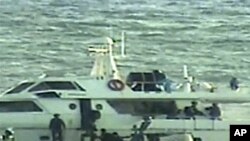The Israeli Navy has seized two pro-Palestinian activist ships in international waters, as they were trying to break Israel's blockade of the Gaza Strip.
Two boats carrying 27 pro-Palestinian activists tried to run Israel's blockade on Gaza, when they were intercepted by Israeli gunboats on the high seas about 80 miles from their destination.
Israeli commandos boarded the vessels and the activists from nine nations surrendered peacefully. The boats were taken to an Israeli port near Gaza and the passengers will be sent back to their home countries. The ships sailed from Turkey earlier this week.
|
Timeline: Gaza Blockade
|
Activists say the Israeli blockade is illegal and immoral and amounts to the imprisonment of 1.4 million Palestinians in Gaza. Canadian David Heap, who was on board, said the message must get out despite the risks.
"The critical need for us is to keep challenging; and in all of that activity and all of that turmoil not forget that the Palestinians of Gaza are under blockade and don't have their freedom of movement," he said.
Israeli spokesman Yigal Palmor says Gaza is controlled by a Palestinian terror group, and therefore, the flotilla is an unnecessary provocation.
"The naval blockade is intended to prevent the terror organization Hamas from supplying itself with rockets and weapons. Any attempt to break that blockade is a cynical mockery of the plight of those innocent [Israeli] civilians who need to live with the horror of the rockets, day in-day out," he said.
The apparent end of the incident without violent confrontation is in sharp contrast to an Israeli commando raid on a Gaza aid flotilla last year in which nine Turkish activists were killed. The bloodshed sparked international outrage.
In Gaza City, Hamas Prime Minister Ismail Haniyeh urged the flotillas to keep coming. "Your message has been delivered whether you make it [to Gaza] or not," Haniyeh said. He added that "the siege is unjust and must end," he said.
Another Hamas official described the Israeli interception of the boats as an act of "piracy" but Israel remains resolute in enforcing the blockade.




